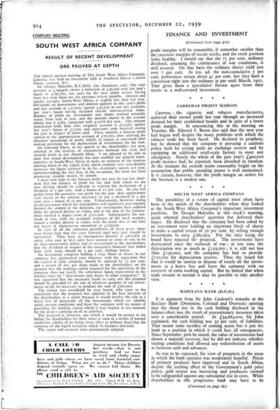COMPANY MEETING
SOUTH WEST AFRICA COMPANY
RESULT OF RECENT DEVELOPMENT ORE PROVED AT DEPTH
THE annual general meeting of The South West Africa Company, Limited, was held on December 19th at Southern House, Cannon Street, London, E.C.
Sir Dougal Malcolm, K.C.M.G. (the chairman), said: Ore sales account, at £149,406, shows a reduction of £48,000 over last year's
figure of £197,761, our sales for the year under review having been less man those for the previous twelve months. Interest and sundry receipts, South-West Africa, is slightly less than last year. Dividends on investments and interest appears in this year's profit
and loss account at £27,610, against £33,332 in our last accounts, last year's figure having included certain non-recurring items.
Balance of profit on investments and shares realised naturally
varies from year to year, and the amount shown in the account before you is £285, compared with £1,678 last year. 1 he amount
transferred from land sales suspense account is £12,583 against last year's figure of £5,720, and represents cash received during the year in respect of farms sold. There remains a balance profit carried to the appropriation account of £70,720, after allowing for directors' percentage of profit, which, of course, is calculated after making provision for the depreciation of investments for the year. Sir Edmund Davis, in his speech to the shareholders last year, referred to the reserves of concentrates between the sixth and seventh levels at our Abenab Mine. I am pleased to be able to state that recent development has now enabled our general repre- sentative in South-West Africa to make an estimate of the reserves existing down to the eighth level, which estimate very considerably increases the figure referred to in the chairman's speech last year, notwithstanding the fact that, in the meantime, the mine has been producing steadily month by month. I must now turn to the forecast made last year by our late chair- man that the balance of profit for the year with which we are now dealing should be sufficient to warrant the declaration of a dividend of 5 per cent. with a bonus of so per cent. As you will gather from the accounts, our profit for the year does approximate very closely to the amount necessary to pay a dividend of 5 per cent. plus a bonus of to per cent. Unfortunately, however, owing to circumstances which the shareholders will appreciate were entirely
beyond the control of the directors, our investments have suffered
from the general decline in values, and at the date of the balance- sheet showed a depreciation of £111,028. Subsequently the out- break of war, with the resultant weakness of the stock markets, caused a further decline in values, with the result that at one time our figure of depreciation amounted to £159,000. In view of all the unknown possibilities of these grave times your board feels that the carry forward until next year should be substantial. They have in consequence deemed it advisable to adopt what may at first sight have seemed to some of you to be an ultra-conservative policy and to recommend to the shareholders that the dividend in respect of the company's financial year ended June 30th, 1939, should be 5 per cent. without bonus.
An investment company holding a large block of shares in our company has approached your directors with the suggestion that
the capital of your company should be reduced by 5o per cent.
and a return of rips. per share made to the shareholders on the grounds that the working capital required for the operations of the company does not justify the substantial figure represented in the balance-sheet by " investments and shares in other companies." It was suggested that the necessary funds to carry out this proposal should be provided by the sale of whatever quantity of our invest- ments might be necessary to produce the sum of £265,903.
The matter was considered by your board, who came to the conclusion that the proposal was contrary to the best interests of the shareholders as a whole because it would involve the sale at a heavy loss of practically all the investments which are saleable under present conditions and leave the company with no means of providing the working capital which it may require at any moment for the proper carrying on of its activities.
The proposal is, however, one which it would- be proper to lay before the shareholders for their views as soon as a return of normal conditions admits of its being given effect to without depriving the company of the liquid resources which its business demands.
The report and accounts were unanimously adopted.




































 Previous page
Previous page